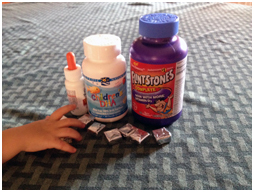If only I had half the energy that my kiddos have, a quarter of their creativity, and a tenth of their spirit. I would be so much more productive at work and at home. I may even finish those baby books. But instead, all too often while my daughter is out of her seat, standing on a stool singing an original number at the top of her lungs, I am pretty exhausted and am pleading with her to return to her seat and just finish dinner. At those times I wish I could be more appreciative of her spunk and the joy that she brings to our lives. I should applaud her creativity and confidence. But instead I think, “Shouldn’t she be able to get through a simple meal without getting up?” Then again, she’s only 4.
As a pediatric neuropsychologist, I am very familiar with ADHD (Attention-Deficit/Hyperactivity Disorder) and executive dysfunction. As a mother, I appreciate that any level of difficulty with attention, emotional and behavioral control in a child can be challenging, even if it’s developmentally appropriate. To that note, I believe that parents can start fostering skills such as effective listening, attention to tasks, organization and behavioral regulation in their children at an early age.
Ideas to Channel Energy & Foster Skills
- Before giving oral directives, gain your child’s attention with eye contact.
- Give specific directions, “I need you to ___.” Consider how many steps you are asking your child to complete. Start with only one and increase the amount of steps with age.
- Ensure comprehension of directives by prompting your child to repeat what is asked of him/her.
- Instead of constantly telling your children what not to do – redirect them to what you want them to be doing.
- Create opportunities for independent completion of tasks at home that are within your child’s ability level. Basic tasks/chores such as picking up their toys, putting dirty clothes in the hamper, and unloading the dishwasher can teach your child responsibility and give him/her a sense of accomplishment.
- Model good organization skills at home. At an early age, teach your child to keep important belongings in set places. For example, shoes always go in the bin by the side door.
- Build in routine at home. Children are more apt to initiate and complete tasks if they are part of a daily routine, and if they know what is expected of them.
- Praise, praise, praise when your child does what you ask of him/her. Also, more importantly, when he/she starts initiating and completing tasks before you need to remind them. A simple “thank you” and “I’m proud of you” can go a long way.
- Build in opportunities to practice focus to tasks on non-electronic activities, such as doing puzzles, playing board/card games, and reading books together.
- Place limits on electronics. I talk with parents all the time who mention that their children spend too much time on video games. As a parent, you and only you are in control of this.
- Allow time every day for some free play and provide opportunities for release of physical energy. This can be hard during winter because simply taking them to a park may not be practical. Is there space in your basement for a tricycle or scooter? Could you take them to a rec center or indoor play gym for a few hours?
- Consider if your expectations for behavior may be too high. Given the stage of development my kids are currently in (ages 2 & 4) we rarely go out to eat because attention spans are short, and they are both very active. I’d rather get take-out than expect them to sit quietly at a restaurant and end up getting frustrated and stressed when they don’t and have an evening that ends in to-go boxes anyway because I haven’t had the chance to finish my meal. If only you could order a margarita with take-out Mexican food. Sigh.





Comments